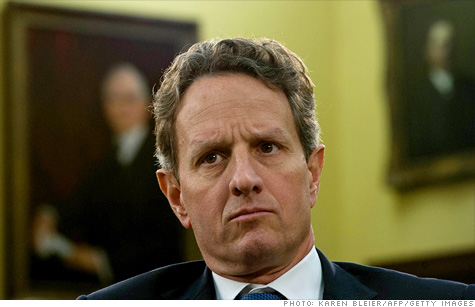
US Treasury Secretary Timothy Geithner testifies at a Congressional hearing earlier this month. The Treasury Department says investments it made in banks during the financial crisis have been profitable.
NEW YORK (CNNMoney) -- The Treasury Department priced preferred shares in an auction of six smaller banks this week as it unwinds positions it acquired during the height of the financial crisis.
Net proceeds from the sale of shares that Treasury purchased under the Troubled Asset Relief Program are expected to top $362 million, according to a statement released Thursday. The Treasury initially invested $410.8 million, which means the auction would translate to a $49 million loss.
However, including proceeds from dividends and interest payments, the total return to taxpayers is $426.4 million, which turns that loss into a profit of about $16 million, according to Treasury.
The results reflect the department's efforts to "balance the important goals of winding down the program and maximizing value for taxpayers," said Treasury spokesman Matthew Anderson. "We view the auction as a success," he added.
Peyton Green, a community and regional bank analyst at Sterne Agee, said the Treasury may have been able to secure a higher price if it had waited another year for the market to fully recover, but the pricing suggests that the Treasury is mainly focused on exiting its TARP positions.
"The message is that they would rather get out and wind the program down more than anything else," he said.
Bernanke: Fed was 'helpless' in Lehman failure
In addition, he said the six banks involved in the auction were among the most likely to continue making dividend and interest payments. They included Banner Corp. (BANR),First Financial Holdings (FFCH), MainSource Financial Group (MSFG), Seacoast Banking Corp. of Florida (SBCF), Wilshire Bancorp (WIBC) and WSFS Financial Corp. (WSFS)
Still, the pricing was widely varied, said Greene. "There's clearly a discerning market for these things," he added.
The Treasury still has to sell preferred shares in another 350 banks in the Capital Purchase Program, which was launched in 2008 to help shore up banks struggling to raise capital.
Under the program, the Treasury provided $205 billion to 707 financial institutions primarily through the purchase of preferred shares. In exchange, participating banks agreed to pay the government a 5% dividend and interest payments of up to 9% after five years.
As the banking sector recovers, the Treasury has been gradually scaling back its various support programs set up during the crisis.
"Today's auction is part of our ongoing efforts to wind down TARP," said Assistant Treasury secretary Tim Massad. "TARP's bank programs succeeded in stabilizing our financial sector and have already earned a significant profit for the taxpayer."
Overall, the Treasury has recovered about $260 billion of the $245 billion invested under various TARP banking programs.
The Supreme Court should have taken a pass on Obamacare
The government has also made money on other TARP investments.
Earlier this month, the Treasury said it made a $25 billion profit on its portfolios of mortgage-backed securities, which it acquired between October 2008 and December 2009.
Meanwhile, the Congressional Budget Office on Wednesday lowered its estimate for the total cost of TARP to $32 billion from $34 billion.
The CBO said the change mainly reflects an increase in the market value of the government's investments in AIG (AIG, Fortune 500) and General Motors (GM, Fortune 500). Those gains offset increased costs stemming from new initiatives in the Treasury's mortgage program, according to the CBO analysis.
Congress authorized $700 billion for TARP, but Treasury only paid out $414 billion. Of that amount, $331 billion has been paid back, including profits, interest and dividends made from investments.
No comments:
Post a Comment